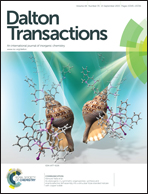Labile ruthenium(ii) complexes with extended phenyl-substituted terpyridyl ligands: synthesis, aquation and anticancer evaluation†
Abstract
Ruthenium complexes have been considered as promising substitutes for cisplatin in cancer chemotherapy. However, novel ruthenium-based therapies are faced with some limitations, such as unimpressive cytotoxicity toward solid tumors. Herein, we designed and synthesized phenyl-substituted terpyridyl ruthenium(II) complexes ([Ru(tpy)(bpy)Cl]+ (Ru1), [Ru(phtpy)(bpy)Cl]+ (Ru2) and [Ru(biphtpy)(bpy)Cl]+ (Ru3)) which exhibited distinctly different anticancer activity. Ru1–Ru3 all underwent moderate aquation in buffer solution and this process was significantly inhibited by high chloride concentration. Cancer cells were found to readily uptake the relatively hydrophobic Ru3, as quantified using inductively coupled plasma mass spectrometry (ICP-MS). Ru1 was found to be non-cytotoxic (IC50 > 100 μM) while Ru3 exhibited very promising cytotoxicity on both two-dimensional (2D) cancer cell monolayers and 3D MCTSs. An antiproliferative assay revealed that Ru3 significantly inhibited cellular DNA replication which ultimately induced apoptosis of cancer cells.


 Please wait while we load your content...
Please wait while we load your content...